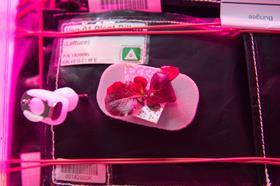
Mushroom medicines, space farms and microchip implants are just some of the big future fresh produce innovations, according to Sainsbury’s latest Future of Food report.
Currently celebrating its 150 year anniversary, Sainsbury’s report makes Blade Runner look like Last of the Summer Wine, featuring an array of future technologies that will change the face of food shopping.
Commissioned by the supermarket, the report was compiled by leading food historian Dr Polly Russell and plant scientist James Wong.
In the next five years they predict food will increasingly be used as preventative medicine, with bio-fortified ingredients such as Chestnut Super Mushrooms, with boosted Vitamin D and B12 becoming more widespread.
There’s good news for the fresh produce industry as they predict that by 2025 a quarter of Brits will be vegetarian, with a half identifying as flexitarian.
In 50 years’ time we could be enjoying ultra-accurate provenance too, thanks to improved blockchain technologies that can show exactly when a crop was picked and at what stage of ripeness it is.
“Soon we may well be selecting mangoes at the exact desired stage of ripeness of even 3D printed snacks according to our exact spice tolerance,” the report states.
By 2169, in 150 years, the food landscape might be unrecognisable, with space farms on planets such as Mars, and patch dinners delivering our daily nutritional needs though a patch or a pill.
Perhaps most unnervingly, they suggest we could have microchip implants in our bodies that store genetic, health and situational data from our bodies, telling us what the best foods to eat at any given time.
These devices could then automatically place an order for drone delivery for the product to help restore energy or nutrient levels.
James Wong said: “For decades, diets have been simplified to include core ingredients that provided sustenance, and with that we witnessed a decline in the varieties of some ingredients. However, what we are seeing now - especially with the explosion of plant-based foods - is that diversity in food is returning to the British diet, including ancient crops like quinoa and South-East Asian staples such as Jackfruit.
“With that increasing variety in diets, comes more understanding of where our food comes from and a deeper appreciation of food production.”
Dr Polly Russell added: 'Throughout history food trends have been determined by a complex range of economic, political, social and technological factors. Although in many ways how we shop, eat and cook looks radically different from 150 years ago, there are some things which will never change - food has always been an important part in bringing people together.
“So, even if we end up relying on patch or pill dinners for our physical health by 2169, food will still play a key part in our emotional, social and psychological wellbeing.'



